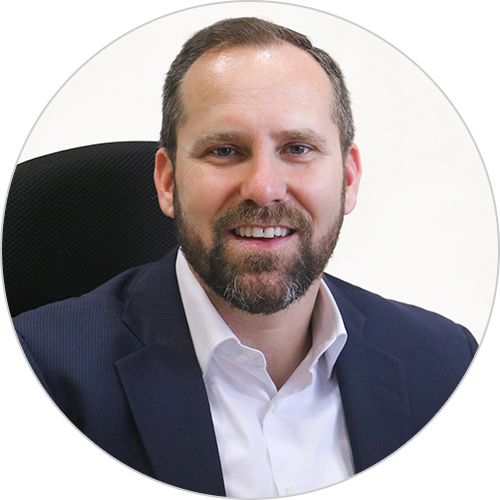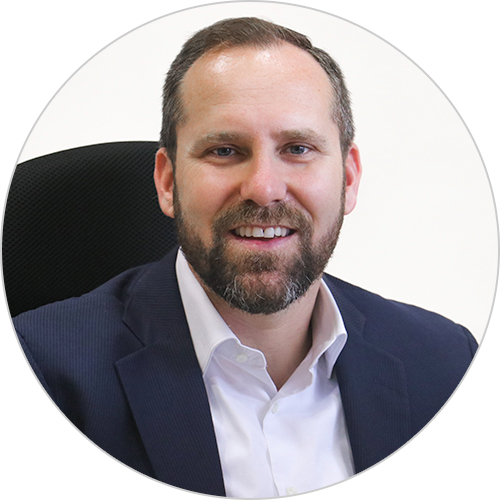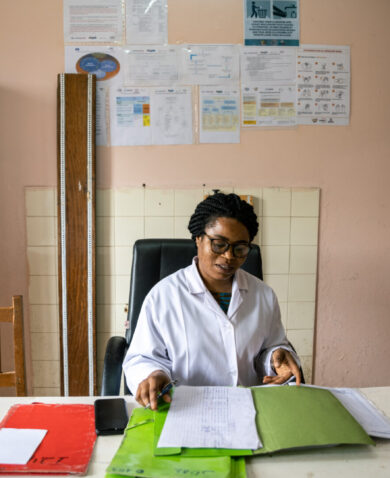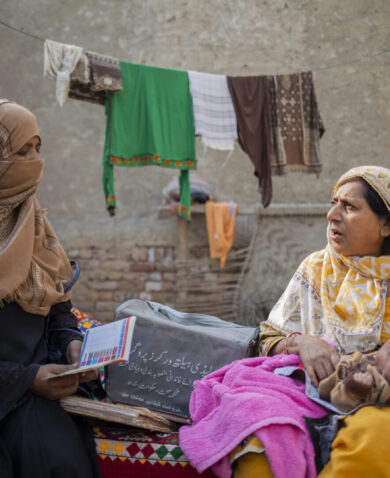
Development Works Here with Rhett Gurian
August 12, 2024 | 5 Minute ReadDevelopment works here because great people work here. We’re excited to introduce you to our team.
 We are thrilled to announce the appointment of Rhett Gurian as the new Senior Vice President of Chemonics’ Global Health Division! With a remarkable career spanning over two decades, Rhett’s impressive background includes leadership roles in transformative projects across Africa, Haiti, and the Middle East, where he has consistently demonstrated his ability to deliver impactful solutions in fragile and conflict-affected regions. His extensive experience in managing complex programs in some of the world’s most challenging environments uniquely positions him to lead our Global Health Division. Rhett is one reason #DevelopmentWorksHere.
We are thrilled to announce the appointment of Rhett Gurian as the new Senior Vice President of Chemonics’ Global Health Division! With a remarkable career spanning over two decades, Rhett’s impressive background includes leadership roles in transformative projects across Africa, Haiti, and the Middle East, where he has consistently demonstrated his ability to deliver impactful solutions in fragile and conflict-affected regions. His extensive experience in managing complex programs in some of the world’s most challenging environments uniquely positions him to lead our Global Health Division. Rhett is one reason #DevelopmentWorksHere.
What has been your career journey, and how have your experiences shaped your approach to global health?
I started my career in development as a Peace Corps volunteer in Benin. I was an English teacher in a small town in the northern part of the country; this experience shaped my early career journey and led me to Chemonics, where I started in 2003. Since then, I have served in a number of roles within the company in both our headquarters and project offices in West Africa, Haiti, and the Middle East. I started as an entry level project management associate and worked my way up to leadership positions. I most recently served as chief of party of a program in Lebanon from 2018-2024 focused on improving the delivery of essential services like water and electricity. Prior to that, I served as senior vice president of our West and Central Africa and Haiti division.
From West Africa to Haiti and beyond, I have lived and worked in countries facing enormous public health challenges. I have seen firsthand the impact of malaria, HIV/AIDS, struggling health systems, and supply chains under stress on local communities. These experiences have shaped my approach to improving global health, which includes applying a multisectoral approach and engaging with the private sector to address some of the world’s most pressing global health challenges.
What motivated you to take on the role of Senior Vice President for the Global Health Division, and how do your previous roles influence your approach to this new position?
I am motivated to take on the role of senior vice president for Chemonics’ Global Health Division because of the potential to achieve significant development impact. Seeing the human impact of my work is incredibly motivating, and global health provides a concrete opportunity to move the needle on the UN’s sustainable development goals, including good health and well-being for all.
From rebuilding Haiti after the 2010 earthquake to improving the delivery of basic services in Lebanon, I have seen the value of strong management, political acumen, and interdisciplinary solutions, which I expect to influence my approach to this new position. I say this because I believe the world’s most complex development challenges – including ensuring equitable access and quality of healthcare – require a multisectoral approach to drive transformative, sustainable change. We don’t live in a vacuum, and development challenges don’t exist in isolation. For example, in order to improve the health system, we need to employ a systems thinking approach that considers a range of interconnected issues including governance, health information, access and equity, quality, policy and regulatory, workforce, and health products. I believe my previous roles have equipped me with the skills and experiences to lead the tremendous talent within Chemonics’ Global Health Division to tackle these challenges.
What are you most excited about in the Global Health Division, and how do you plan to leverage your experience in peace, stability, and local governance in this role?
I am most excited about working in a sector like global health where I can see the human impact of our work. Achieving and measuring development impact is sometimes obscure, but health outcomes are concrete. And knowing that I have contributed to helping people to live happier, healthier, and more productive lives gives me great satisfaction.
Unfortunately, there is no shortage of crisis in this world, so my experience in peacebuilding, community stabilization, and local governance has prepared me well for this role. One in five countries is considered fragile and conflict-affected, representing nearly 1 billion people and 43 percent of the world’s poor. Given the overlap between fragile and conflict-affected states and the limited provision of basic services, including health, I plan to build upon my previous experience to ensure that we are using a conflict-sensitive approach to achieve better health outcomes. For example, I will leverage my previous experience to assess the drivers of conflict and violence within the entire system and ensure that our interventions are not exacerbating any root causes of conflict like inequitable access to services.
What do you see as the biggest challenges facing global health today, and how can Chemonics contribute to overcoming these challenges?
I see the nexus between global health and both persistent and emerging threats as the biggest challenges facing global health today. These include 1) the growing number of fragile and conflict-affected states; 2) climate change; and 3) global health security. Chemonics can contribute to overcoming these challenges by leveraging its nearly 50 years of experience delivering development solutions in multiple sectors and countries. I look forward to applying a multidisciplinary approach and building upon our proud history of promoting sustainable development solutions by working with and through a robust network of local partners.
How do you plan to foster innovation within the Global Health Division, and what are your thoughts on the importance of collaboration between various sectors and stakeholders in improving global health outcomes?
Collaboration between various sectors and stakeholders is a key factor in improving global health outcomes. Our shared experience suggests that it takes a multisectoral approach to address the world’s most complex development challenges, including ensuring good health and well-being for all. Given my experience responding to some of the world’s most complex crises – including conflict in the Democratic Republic of Congo, Haiti earthquake, Syrian civil war, and Beirut port explosion – I have seen first-hand the benefits of collaborating with all stakeholders within the local system as well as the importance of localization and building strong local partners in ensuring sustainable impact, and I intend to apply this approach to Chemonics’ Global Health Division.
Can you share a personal anecdote or experience that has inspired you in your career?
In Lebanon, I recently led a program that was focused on improving the delivery of essential services and enhancing economic opportunities in some of the country’s most underserved and vulnerable communities. One example of our work was improving access and quality of water to a community in southern Lebanon in response to rapid urbanization and shifting demographics. We did this by working in partnership with the local municipality and water utility to construct an elevated water tank, install a new chlorination system, and improve the water distribution line. I recall one woman from the community commenting about how before the intervention, she struggled to purchase trucked in water; she voiced concerns about the cleanliness of that water and shared how she used to resort to collecting water from leaking pipes to do her laundry. However, once the new system was installed, she shared that her morale and quality of life had improved. She mentioned that the money she used to spend on water is now being used for other priorities, like food and her children’s education. This is just one example of locally led, sustainable development in action, and it is these types of stories that inspire me in my career.
Posts on the blog represent the views of the authors and do not necessarily represent the views of Chemonics.

















